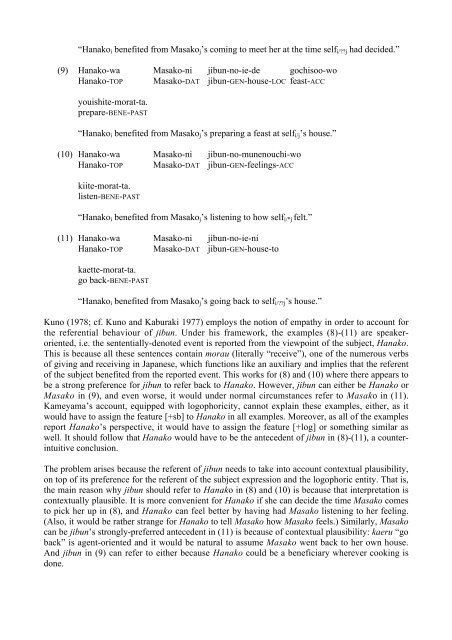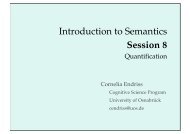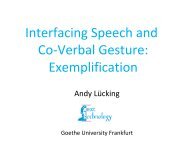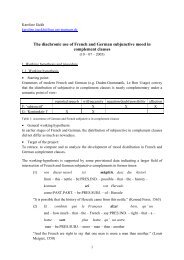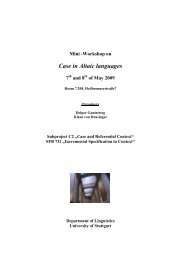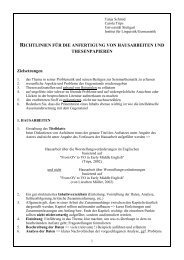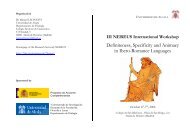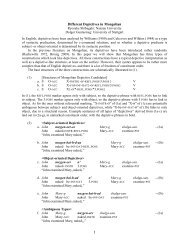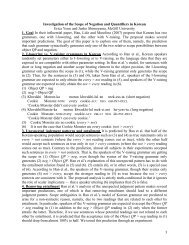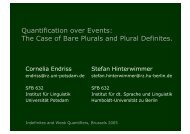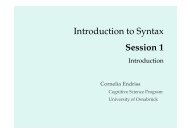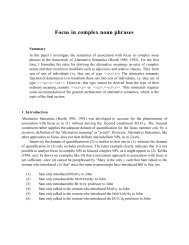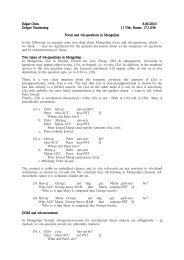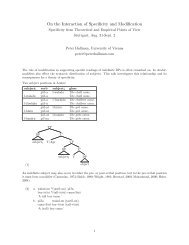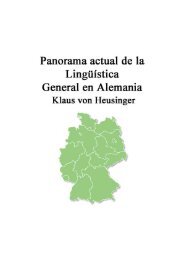SemPrag03.Progr.pdf - Institut für Linguistik/Germanistik - Universität ...
SemPrag03.Progr.pdf - Institut für Linguistik/Germanistik - Universität ...
SemPrag03.Progr.pdf - Institut für Linguistik/Germanistik - Universität ...
You also want an ePaper? Increase the reach of your titles
YUMPU automatically turns print PDFs into web optimized ePapers that Google loves.
“Hanako i benefited from Masako j ’s coming to meet her at the time self i/??j had decided.”<br />
(9) Hanako-wa Masako-ni jibun-no-ie-de gochisoo-wo<br />
Hanako-TOP Masako-DAT jibun-GEN-house-LOC feast-ACC<br />
youishite-morat-ta.<br />
prepare-BENE-PAST<br />
“Hanako i benefited from Masako j ’s preparing a feast at self i/j ’s house.”<br />
(10) Hanako-wa Masako-ni jibun-no-munenouchi-wo<br />
Hanako-TOP Masako-DAT jibun-GEN-feelings-ACC<br />
kiite-morat-ta.<br />
listen-BENE-PAST<br />
“Hanako i benefited from Masako j ’s listening to how self i/*j felt.”<br />
(11) Hanako-wa Masako-ni jibun-no-ie-ni<br />
Hanako-TOP Masako-DAT jibun-GEN-house-to<br />
kaette-morat-ta.<br />
go back-BENE-PAST<br />
“Hanako i benefited from Masako j ’s going back to self i/??j ’s house.”<br />
Kuno (1978; cf. Kuno and Kaburaki 1977) employs the notion of empathy in order to account for<br />
the referential behaviour of jibun. Under his framework, the examples (8)-(11) are speakeroriented,<br />
i.e. the sententially-denoted event is reported from the viewpoint of the subject, Hanako.<br />
This is because all these sentences contain morau (literally “receive”), one of the numerous verbs<br />
of giving and receiving in Japanese, which functions like an auxiliary and implies that the referent<br />
of the subject benefited from the reported event. This works for (8) and (10) where there appears to<br />
be a strong preference for jibun to refer back to Hanako. However, jibun can either be Hanako or<br />
Masako in (9), and even worse, it would under normal circumstances refer to Masako in (11).<br />
Kameyama’s account, equipped with logophoricity, cannot explain these examples, either, as it<br />
would have to assign the feature [+sb] to Hanako in all examples. Moreover, as all of the examples<br />
report Hanako’s perspective, it would have to assign the feature [+log] or something similar as<br />
well. It should follow that Hanako would have to be the antecedent of jibun in (8)-(11), a counterintuitive<br />
conclusion.<br />
The problem arises because the referent of jibun needs to take into account contextual plausibility,<br />
on top of its preference for the referent of the subject expression and the logophoric entity. That is,<br />
the main reason why jibun should refer to Hanako in (8) and (10) is because that interpretation is<br />
contextually plausible. It is more convenient for Hanako if she can decide the time Masako comes<br />
to pick her up in (8), and Hanako can feel better by having had Masako listening to her feeling.<br />
(Also, it would be rather strange for Hanako to tell Masako how Masako feels.) Similarly, Masako<br />
can be jibun’s strongly-preferred antecedent in (11) is because of contextual plausibility: kaeru “go<br />
back” is agent-oriented and it would be natural to assume Masako went back to her own house.<br />
And jibun in (9) can refer to either because Hanako could be a beneficiary wherever cooking is<br />
done.


